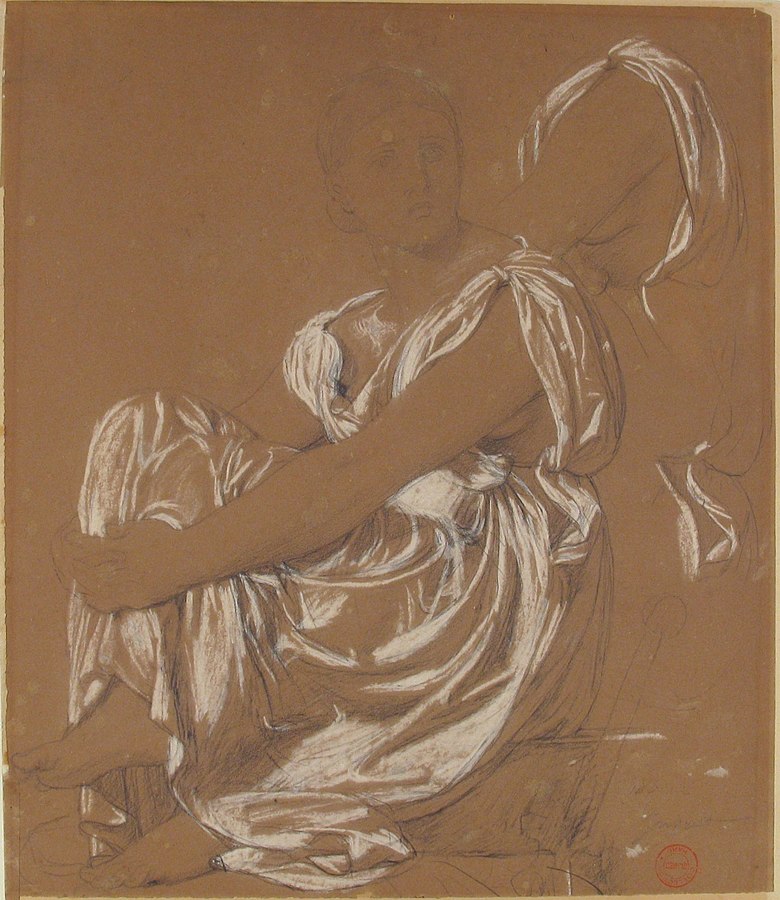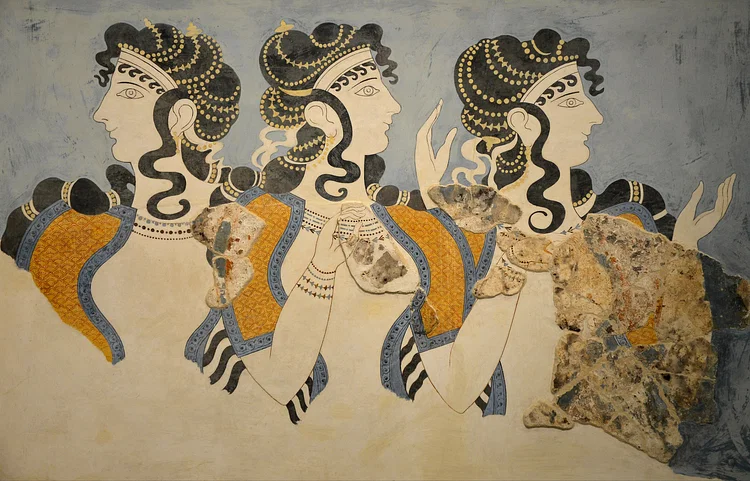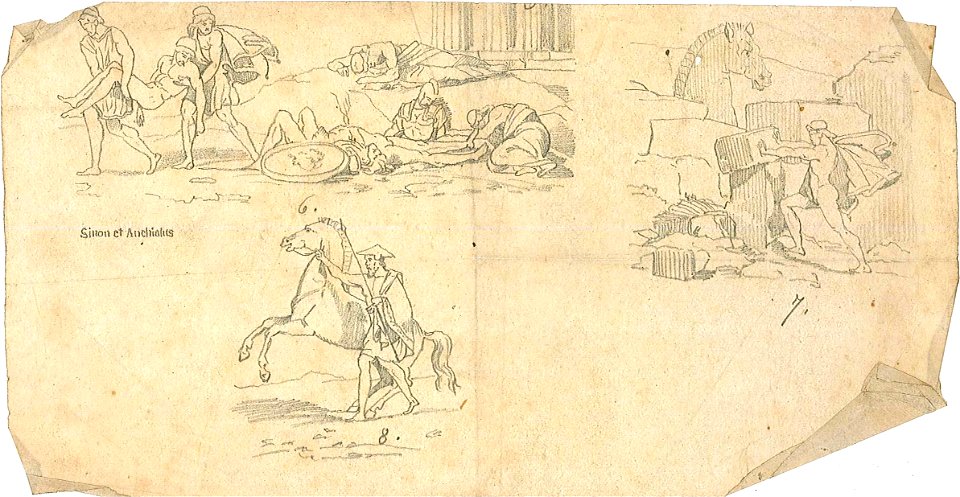
Rachel Pafe is a writer and researcher interested in modern Jewish thought and critical theories of mourning. She is currently doing a joint PhD at Goethe University of Frankfurt and Université Lille.
For more information visit Rachel’s Page.
To read the German-version of the article, please click here.
In her 1956 dissertation on French philosopher-mystic Simone Weil, Hungarian-American philosopher and writer Susan Taubes often harshly presents Weil’s theology of an absent, impotent God who wills human suffering as representative of a retreat from practical attempts to combat injustice and alleviate the suffering of others. Yet what at first seems like an outright rejection of Weil, especially through what Taubes describes as Weil’s later “theological turn” away from her earlier political thought, becomes more complex. Taubes often agrees with many of Weil’s basic critiques of violent modern institutions and political systems that perpetuate violence. I argue that indeed, Taubes’ critique of Weil is so harsh at times because she sees many of Weil’s later more extreme and fatalistic conclusions as wasting the potential opportunities of her original insights. This is particularly evident in Taubes’ analysis of Weil’s essay “The Iliad, or The Poem of Force” (1945) as a strong example of Weil’s thought on the precipice of her so-called theological turn, namely as a site in which qualities eventually transferred solely to a supernatural God are still seen as human possibilities.
Taubes argues that the subject of Weil’s essay, the geometrically equal application of force and violence in the epic war poem The Iliad, is a connecting thread between Weil’s early political work and later theological writings in which Weil’s growing fatalism concerning worldly violence crystallizes into a theological principle. My paper traces the liminal space that Taubes points out in Weil’s essay: the chance for the miracle of love between friends, family, and loved ones as a respite from the ravages of violence and power. Taubes argues that this human miracle of love and Weil’s later concept of the supernatural grace of an absent and impotent God are “the same truth”, or means of saving a part of the human soul, for Weil. Yet, Taubes asserts, Weil eventually chooses the “surer option” of supernatural grace for want of a more totalistic solution. I argue that Taubes sees Weil’s notion of the miracle of human love as central to her own ethical vision: a call to embrace both the uncertain absence of God and brief moments of love between humans that shine through the darkness.
Taubes was born in Budapest, Hungary on January 12th, 1928, to secular Jewish parents and immigrated to the United States in 1939. In the late forties and early fifties, Taubes undertook a BA in philosophy at Bryn Mawr College and studied at the Sorbonne in Paris, where she interacted with Emmanuel Levinas, Albert Camus, and Simone Pétremont. In 1956, she became the first woman to obtain a PhD at Harvard. Recent scholarship on Taubes emphasizes the context in which she undertook her philosophical work, namely that she was active in the first decade after WWII indelibly stamped by the memories of recent extreme violence, the impact of Nietzsche’s understanding of the death of God, and the blending of estrangement and
hopes for salvation. (1)
After writing her dissertation, Taubes then lectured at Columbia University and Barnard College, and worked as a curator at Columbia’s Bush Collection of Religion and Culture from
1958-1962. This culminated in many ways in her final, recently republished novel, Divorcing, which arguably offers some of the most radical, poetic articulations of her ethical vision. It was shortly after the publication of Divorcing in 1969 that Taubes took her own life.
Taubes’ dissertation deals with Weil in three sections: an analysis of her early political writings, an analysis of what she deems Weil’s later “theological turn”, and a proposition of a unique ethical vision that both draws on and sharply diverges from Weil. A main crux of Taubes’ discussion is that Weil’s search for a solution to human suffering is first combatted through an engagement with Marxist, syndicalist thought in her political writings, but takes a defeatist turn in her theological writings. Namely, Taubes posits that Weil’s turn to theology represents a final attempt to find an absolute explanation for suffering by tying violence and oppression to supernatural causes. In response to the suffering of others, Taubes argues that Weil sought an absolute solution to “the silence of God…by radicalizing a secular dilemma to the point where it demands a theological solution”. (2)

For Weil, an absent and impotent God has abandoned the world of violence and suffering, which makes the human relation with God one in which “supernatural love is not a quickening of the soul; [but…] a kind of death”. (3)
In this schema, humans cannot intervene in the violent world that God created and abandoned; the only way to receive the grace of this God is to embrace the incredible suffering of the world and enter a process of de-creation, or the removal of the bodily self from the world.
In the final chapter of Part I of Taubes’ dissertation, “From Socialism to the Supernatural”, Taubes positions Weil’s essay “The Iliad, or The Poem of Force” (1945) as the strongest example of the grounding of her theological turn, alongside her reflections on work written in Marseilles (1941-1942). She argues that while this essay does not yet posit the explicit terminology that Weil uses in her later writing on theological issues, it deals with similar themes, particularly the alienating power of human misery in war and the dehumanizing capacities of oppression. Interestingly, Weil does not mention Greek religious practices in this essay but does draw a parallel to the Gospels, stating that they are the last example of the Greek genius because they both exhort humans to seek godly good above all else, but namely because human suffering is revealed in the figure of Christ. Taubes argues that in “The Iliad, or The Poem of Force,” Weil reacts in a fatalistic manner to the ravages of power, which later crystallizes into a theological principle. Yet in “The Iliad,” Weil does not mention the supernatural. She:
achieves a sustained lucidity of tragic insight, as if her mind found a poise between the desperate search for a solution to social problems and the need to find a religious explanation for man’s suffering, and could allow human affliction to speak for itself without seeking for solutions of explanations. (4)
In “The Iliad, or The Poem of Force,” Weil analyzes Homer’s The Iliad, an epic poem that famously tells of the last year of the ten-year Trojan War in which the Greek states fight Troy in the attempt to reclaim Helen, the wife of Melelaus, King of Sparta, who was captured by Trojan prince Paris. Literary critic Christopher Benfey argues that what is most striking about this essay is the way in which Weil reinterprets and translates Homer’s poem to make it decidedly more violent than the original. (5) This focus comes through in several examples of Weil’s particular translation, especially a passage where Achilles pushes away Priam as he begs for mercy. While Weil’s version presents this gesture as yet another example of all-consuming violence and men reduced to the status of objects, other translations such as Robert Fagle’s include the word “gently”, which changes this moment from one of degradation to one of empathetic connection.
Benfey underlines that, “the point is not whether Weil misreads Homer, but why she does so…Weil has extracted from the complicated weave of Homer’s narrative two sharply etched ‘disasters of war’”. (6) Taubes likewise underscores the overarching theme of Weil’s essay as the geometric, or equal application, of brute force, “force employed by man, force that enslaves man, force before which man’s flesh shrinks away”. (7) In this context, Taubes argues that just as Weil’s later theological writing was concerned with the balance of forces of natural gravity and supernatural grace, or the violence of the immanent world versus the supreme transcendence of divine love, so is her Iliad essay concerned with the balance of war and peace. Weil underlines The Iliad as a supreme example of the equity of force and violence, one in which “bitterness that proceeds from tenderness and that spreads over the whole human race, as impartial as sunlight” in the context of a force so powerful that, “exercised to the limit, it turns man into a thing in the most literal sense: it makes a corpse out of him”. (8).
Weil traces the equal application of such force in The Iliad as it destroys the humanity of victims and victors alike. Weil emphasizes that “by its very blindness, destiny establishes a kind of justice” through a “geometrical rigor” rooted in the power of force to efface all who touch it. (9) Yet Taubes underlines that Weil mentions exceptions to such equal and all-effacing violence, namely moments of what she terms “grace,” or moments in which it is possible for humans to save the soul from the total ravages of violence and resist becoming an object. She argues that:
What is important is that this grace does not serve to server man’s earthly attachments, but on the contrary, radiates from a tenderness for all that men cherish in their earthly city. The moments of grace in this poem of violence and horror are ‘those brief celestial moments in which man possesses his soul.’ The love between man and wife, parents and children, between friends, gestures of hospitality figure as instances of such moments of grace, which however rare in the Iliad ‘are enough to make us feel with sharp regret what it is that violence has killed and will kill again. (10)

This passage is significant because Taubes devotes much energy in later chapters to describing Weil’s later theology as that of an impotent and absent God who wills ceaseless human suffering. Weil emphasizes the element of human choice and decision to enter the aforementioned process of de-creation as the sole means of human decision in a world otherwise predetermined by the cruel hand of fate. In accepting this process, the human is able to avoid being reduced to a mere object by the forces of ceaseless violence around them. They are thus able to guard the tiny spark of God within their soul from worldly destruction and lead it to reunion with the transcendent supernatural God.
Yet Weil’s Iliad essay, written on the precipice of her “turn” to such theological writing, does not mention the supernatural and seems to present human love and community as capable of such an act of saving the soul. Taubes underlines that, “The world of war depicted in the Iliad thus reflects, in however infinitesimal degree, the light of another world: ‘the faraway precarious touching world of peace, of the family, the world in which each man counts more than anything else to those about him.’” (11) Weil is thus aware of a level of transcendence available through human capacities, an awareness that Taubes sees as paralleling her later investment in supernatural capacities:
Perhaps the ‘supernatural’, the reality ‘outside of this world’ and the spirit of grace, justice, and love which though they have hardly any place in the poem of war ‘nevertheless bathe the work in their light, without ever becoming noticeable themselves, except as a kind of accent’ ultimately designated the same truth for Simone Weil. And yet the reflections that issued from her own religious position confirm the suspicion that if the supernatural safeguards the image of the forsaken reality of man’s soul, and perhaps more ‘categorically’ than poetry, it tends, unlike poetry, to usurp the soul’s treasures for itself, never to return them again to man’s everyday reality, so that the world is abandoned to its wars and grace flourished by denuding man of his earthly vestment, and dispossessing him of that part of his soul which is earthbound. (12)
Taubes asserts that despite Weil’s recognition of the possibilities of human communal love and connection, she eventually found supernatural truth proved to be the surer and more total guardian of man’s soul. This is the crux of Taubes’ argument, namely that the cost of turning to the surer supernatural is too high because this necessitates removing man’s soul from the immanent world and reality.
As she notes in the previous passage, the supernatural “tends, unlike poetry, to usurp the soul’s treasures for itself, never to return them again to man’s everyday reality, so that the world is abandoned to its wars and grace flourished by denuding man of his earthly vestment.” Weil’s turn, Taubes asserts, comes at the cost of abandoning real-life struggles in the world and any engagement with reality.
At various other moments throughout her dissertation, Taubes returns to the question of how to engage with the reality of violence through exploring this idea of inter-human moments of love as first described in her analysis of Weil’s Iliad essay. Taubes is interested in this essay precisely because it seems to be the precipice that Weil leans on before withdrawing her hope from the immanent world and human connections and communities within it. The conclusion of her dissertation, which includes Taubes’ unfinished but evocative ethical vision, is rooted in the dismantling of the boundary between the aforementioned idea of human love and supernatural grace.
Taubes laments that despite the possibilities of Weil’s thought, namely that it points the way to a new kind of saintliness that arises from the absence of God, Weil is not able to accept such implications because of her reliance on the idea of a divine power. (13). The traditional model of sainthood, Taubes notes, is rooted in the model of the saint facing spiritual hardships but never questioning their faith in God. She proposes the new saint as one who faces such challenges in the absence of God and develops a form of spirituality precisely premised on this absence. (14) Yet:
Simone Weil recoils from drawing the radical consequences of the divinity of the soul in the absence of God, and removes the scandal of man’s superiority to “God” (i.e. blind force and necessity) by restoring the theistic frame. The metaphor of the absent God, which at one stage merely provides the scaffolding for a trans-theistic spiritualism, is built upon a solid theological edifice. (15)

In this context, Taubes frames the power of the absent God as rooted in its metaphorical potential rather than an actual divine presence. This act enables one to dwell in the notion of “the divinity of the soul in the absence of God” while simultaneously refusing a theistic frame. (16) Such a negative theological refusal imbues humans with spiritual energy not tied to a transcendent divine power. Building on this argument, Taubes asserts that Weil’s efforts to accept God as the source of the absolute good fail because there are no examples of His love to be found in the world, thus forcing Weil to return to human acts of love:
While the God of Simone Weil’s theology is “good by definition”, she must constantly appeal to human acts of supernatural love, justice, and humility as the only visible manifestations of good in the world. In contrast, God’s goodness manifests itself in its absence in the world, through evil. (17).
Taubes accordingly describes human love as “supernatural” in the passage above, underlining her model of saintliness in which humankind becomes divine in the absence of God. (18) This love finds itself alongside justice and humility as other saintly virtues, contrasted with God’s “absence” and “evil.” The dissonance of not finding any instances of God’s good manifest in the world, Taubes argues, leads Weil to a paradoxical position in which she rejects belief in God’s intervention in human life and revels in this radical uncertainty, yet contradicts this stance through her absolute certainty in an absent divine presence. Thinking back to her aforementioned argument that the humanly love described by Weil in the Iliad her later notion of grace are the same thing, Taubes suggests that the acceptance of this uncertainty leads to a reclamation of love as grace in firmly human hands. Namely, it “allow(s) human affliction to speak for itself without seeking for solutions of explanations”, religious or otherwise.
In this schema, Taubes asserts that, “In the ‘death of God’ the messianic vision of the emancipated spiritual man who lives by grace, beyond good and evil, was reborn in a new form”. (19) She thus ends her dissertation with a powerful call for the potential of reveling in the absence of God: the vision of human spirituality able to transcend the theistic dichotomy of good and evil and able to reclaim love and grace as immanent virtues geared towards an ongoing, imperfect search for worldly justice.
Footnotes
1. See: Sigrid Weigel. “Between the Philosophy of Religion and Cultural History: Susan Taubes on the Birth of Tragedy and the Negative Theology of Modernity.” Telos 150 (2010): 115-135. http://journal.telospress.com/content/2010/150/115
2. Taubes, Susan. The Absent God: A Study of Simone Weil. Unpublished dissertation from Harvard University, 1956, 140.
3. Ibid, 241.
4. Ibid, 154.
5. Weil, Simone and Rachel Bespaloff. War and the Iliad. Trans. Mary McCarthy. New York: New York Review of Books, 2005.
6. Ibid, xv.
7. Weil, Simone. The Iliad or the Poem of Force, 3.
8. Ibid, 3.
9. Ibid, 13.
10. Taubes, Susan. The Absent God: A Study of Simone Weil, pp. 155-156.
11. Ibid, 156.
12. Ibid. 157.
13. Weil is described as a “new kind of saint” in Eric Tomlin’s early exploration of her work. See: Eric Tomlin. Simone Weil. New Haven, Conn.: Yale University Press, 1954.
14. Christina Pareigis discusses Taubes’ “negative theology”, especially in relation to her correspondence with Jacob Taubes, stating, “Susan Taubes’s own conceptual labor involved an effort to integrate a partly personal, partly collective experience of extreme violence into a distinctive mode of civilizational critique: one catalyzed by a dialectic secularizing movement in which nihilism is transformed into a negative theology.” Pareigis, Christina. “Searching for the Absent God: Susan Taubes’ Negative Theology.” Telos 150, 97-110 (2020). http://journal.telospress.com/content/2010/150/97.abstract.
15. Taubes, Susan. The Absent God: A Study of Simone Weil, 378.
16. On the topic of Taubes’ critique of Weil’s mystical atheism, see: Elliot Wolfson, The Philosophical Pathos of Susan Taubes (Stanford: Stanford University Press, 2023). See especially: “Chapter Four: Tragedy, Mystical Atheism” in which Wolfson discusses the idea that “Apophatic theology is not sufficient and must be transposed kataphatically if one is to establish a relationship to a divine being that is present” (Wolfson 2023: 221).
17. Taubes, Susan. The Absent God: A Study of Simone Weil, 373.
18. This notion of the supernatural human is also very closely connected for Taubes with the topic of Gnosticism, which I lack the space to unpack in this essay. I discussed Taubes’ relation to Gnosticism in a co-authored text with Mimi Howard, “Howard, Mimi, Pafe, Rachel (2020). Selves Amidst the Blushing Dead: The Task of Reclamation in Susan Taubes’ Divorcing. In: R. Pafe (Ed.) Reading Scholem in Constellation. Berlin: Colorama Press and PseudoPress, 2020) and my MA thesis, Susan Taubes and the Absent God: On the Critique of Religious Tyranny and an Ethics of Mourning (Universität Potsdam, 2021). See also: Epstein, Deborah. “Gnosis und Dialektik bei Susan Taubes” in Geschichtsphilosophie und Eschatologie: Perspektiven nach Jacob Taubes. Münster: Lit Verlag, 2024.
19. Taubes, Susan. The Absent God: A Study of Simone Weil, 391.